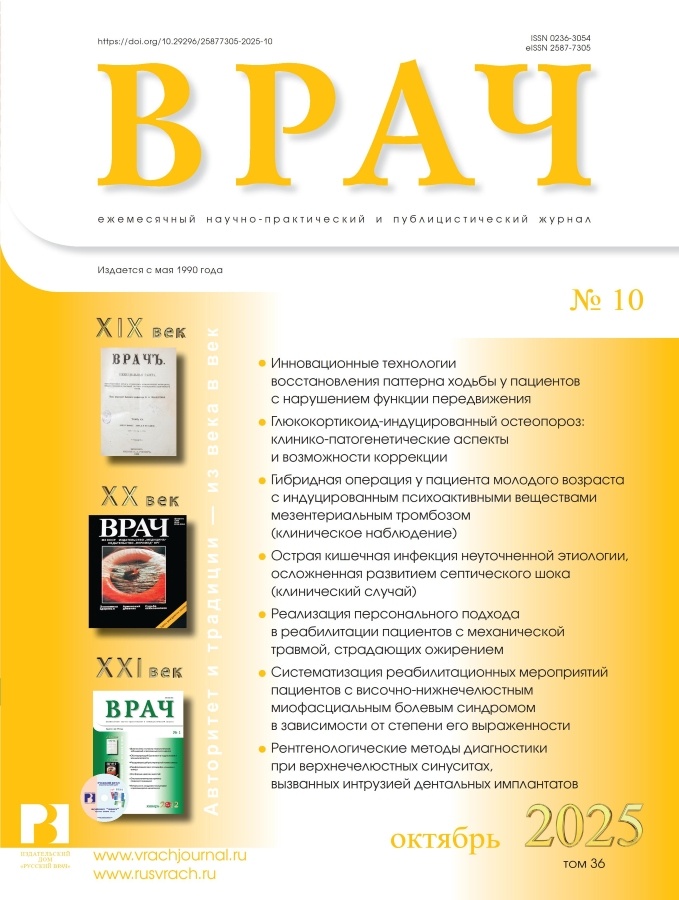Assessment of the change in quality of life for patients after surgical treatment of scoliotic spinal deformity based on the SRS-22 questionnaire survey
- Authors: Roytberg G.E.1, Smirnov I.V.1, Kondratova N.V.1
-
Affiliations:
- JSC Medicine (Academician Roytberg’s Clinic)
- Issue: Vol 36, No 10 (2025)
- Pages: 55-56
- Section: From Practice
- URL: https://journals.eco-vector.com/0236-3054/article/view/696305
- DOI: https://doi.org/10.29296/25877305-2025-10-10
- ID: 696305
Cite item
Abstract
Purpose. To assess the quality of life of patients after surgical treatment of scoliotic spinal deformity using the SRS-22 questionnaire.
Material and methods. The study involved 48 patients who underwent surgery for correction of scoliotic spinal deformity in the period 2020–2025. The patients were divided into 2 groups: 1st (n=24) – patients filled out the SRS-22 questionnaire before surgery; 2nd (n=24) – patients filled out the SRS-22 questionnaire in the long-term postoperative period.
Results. The most significant changes after surgery were obtained in the domains “function” (p < 0.001), “appearance” (p = 0.001), “satisfaction with treatment”
(p = 0.001). Less significant changes were found in the “pain” domain (p = 0.029). There was no significant difference in the “mental health” domain (p = 0.059). The final assessment of quality of life after surgery was significantly higher (p < 0.001) compared to the indicator before surgery.
Conclusion. Patients with severe scoliotic spinal deformity before surgery have lower scores in the domains of “function,” “pain,” “appearance,” and “satisfaction with previous conservative treatment.” Surgical treatment improves quality of life in all major domains.
Keywords
Full Text
About the authors
G. E. Roytberg
JSC Medicine (Academician Roytberg’s Clinic)
Author for correspondence.
Email: smirnov@medicina.ru
ORCID iD: 0000-0003-0514-9114
SPIN-code: 1032-9122
Professor, Academician of the Russian Academy of Sciences, MD
Russian Federation, MoscowI. V. Smirnov
JSC Medicine (Academician Roytberg’s Clinic)
Email: smirnov@medicina.ru
ORCID iD: 0000-0002-5348-3400
SPIN-code: 2224-3530
Russian Federation, Moscow
N. V. Kondratova
JSC Medicine (Academician Roytberg’s Clinic)
Email: smirnov@medicina.ru
ORCID iD: 0000-0003-2421-0558
SPIN-code: 6090-2734
MD, Professor of the Russian Academy of Sciences
Russian Federation, MoscowReferences
- Пятакова Г.В., Оконешникова О.В., Кожевникова А.О. и др. Психологические аспекты лечения и реабилитации пациентов с подростковым идиопатическим сколиозом: метаанализ исследований. Ортопедия, травматология и восстановительная хирургия детского возраста. 2019; 7 (2): 103–15 [Pyatakova G.V., Okoneshnikova O.V., Kozhevnikova A.O. et al. Psychological aspects of treatment and rehabilitation of patients with adolescent idiopathic scoliosis: research analysis. Pediatric Traumatology, Orthopaedics and Reconstructive Surgery. 2019; 7 (2): 103–15 (in Russ.)]. doi: 10.17816/PTORS72103-115
- Губин А.В., Прудникова О.Г., Камышева В.В. и др. Клиническая апробация русскоязычной версии анкеты SRS-22 для взрослых пациентов со сколиозом. Хирургия позвоночника. 2017; 14 (2): 31–40 [Gubin A.V., Prudnikova O.G., Kamysheva V.V. et al. Clinical testing of the Russian version of the SRS-22 questionnaire for adult scoliosis patients. Spine Surgery. 2017; 14 (2): 31–40 (in Russ.)]. doi: 10.14531/ss2017.2.31-40
- Gardner A., Cole A., Harding I. What does the SRS-22 outcome measure tell us about spinal deformity surgery for Adolescent Idiopathic Scoliosis in the UK? Ann R Coll Surg Engl. 2021; 103 (7): 530–5. doi: 10.1308/rcsann.2021.0005
Supplementary files






